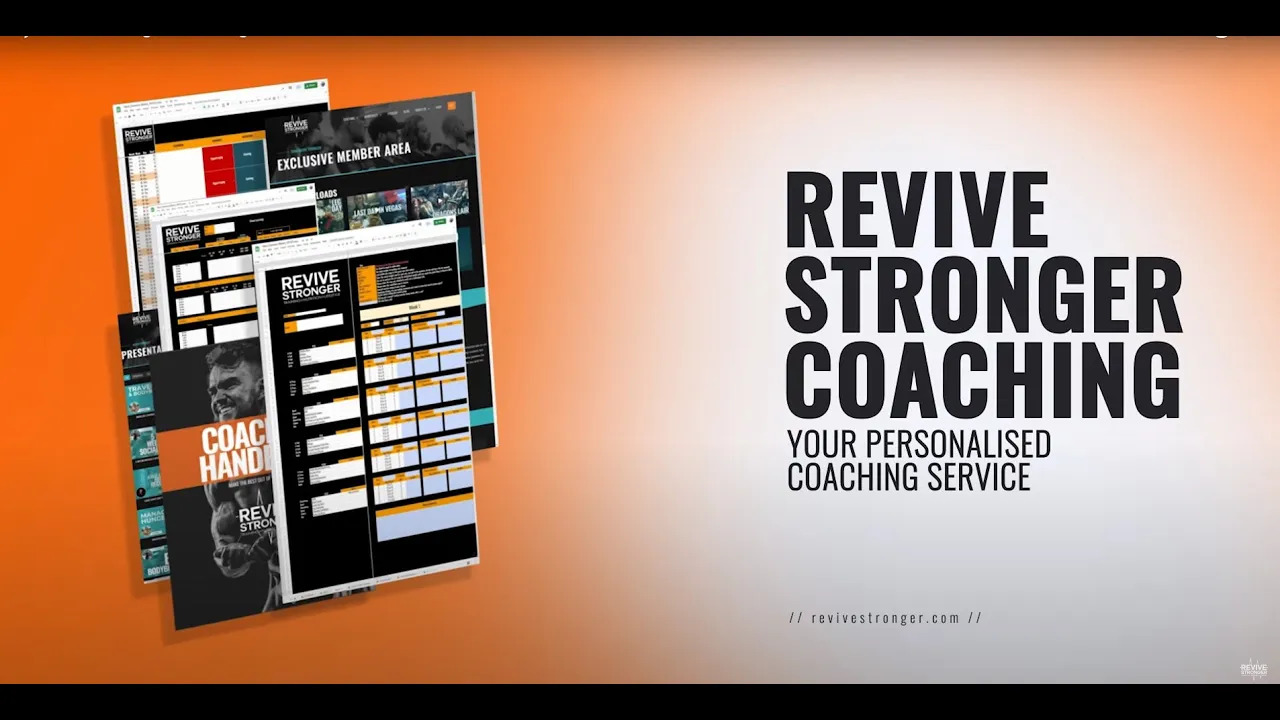
Revive Stronger
Perfect Peaking ‘Peak Week’ – Coaching Interview

So over the past few weeks I have been sharing with you tools to ‘Get Shredded’.
Today I am going to take a break from the series and go into something you might get shredded for.
A Bodybuilding Show, Physique Contest or Photo-Shoot.
These are all things you will want to look your best, and that often means getting really lean.
If you’re looking to do any of these you want to look your best on the day right?
So you may end up Googling “How to look my best on show day”.
I have no doubt in my mind that something called ‘Peak Week’ will pop up.
Peak week is exactly what I am going to be talking to you about today. For me it is a very confused subject and can easily lead to some potentially harmful outcomes. That is why I am going to be joining forces with a fellow coach Jonathon Potter, to tell you our methods for looking your best.

Jonathon has been helping people get super lean for such events for the past three years, he has worked with people in both the UK and US, helping many win trophies. I have also worked with people across the globe in Natural Bodybuilding, Mens Physique and Photo-shoots, plus competed twice in Natural Bodybuilding in 2014. We therefore have a lot of experience in getting people looking their best, and are both highly passionate about it.
So without further ado, lets get into the interview.
Table of Contents
Q) Who is Peak Week for?
S. Hall: Before I talk about who it is for I think it is important to talk about what it isn’t. Peak week isn’t a magical time where you transform the way your body looks. Peak week isn’t a complete overhaul of what you’ve been doing the weeks prior. In reality peak week is a very small period of refinement, at least in the way I approach it.
[bctt tweet=”There are no shortcuts to a great physique.”]
Therefore, that means Peak Week is only actually going to be of benefit to a very select few number of people and situations. I have used a ‘peak week’ type protocol for those trying to present their best look for a certain time. This might be a photo shoot or a physique show, you are essentially trying to ‘peak’ your look. Like you periodise your training; manipulating volume and intensity to eventually bring about a peak performance, but instead you manipulate things to bring a peaked physique.
Thus, I am assuming if you are doing a photo shoot or a physique contest, then you’re very lean. When I say very lean I mean striation lean, a fully fledged 6 pack, you’re sitting well below 10% body fat. If you’re not one of these people, you have no need to try to use any sort of peak week. Only the super lean will benefit, and even then, the benefit isn’t huge.
J. Potter: Personally I believe for a peak week to be effective you need to be ready weeks before your comp date. As an example for male bodybuilding competitors 2 weeks before a show you should see striations in your glutes.
Basically anyone who isn’t shredded, IMO lean doesn’t cut it and won’t benefit. With a person who is chasing their tail and running out of time I would possibly keep them in a deficit in the final week to hopefully drop one more pund and load them with carbs slightly the night before the show. If you aren’t super lean, peak weeks are pointless.
Q) What is Peak Week?
S. Hall: So as I touched on before peak week is a short period of manipulation to try to bring about someone’s best physique or look. I personally do not like to change anything drastically. That means no major changes in food, training or water intake. You should already be shredded and looking amazing, so any small tweaks will make only a subtle difference. So therefore as I coach I make sure my clients look fantastic before peak week.
[bctt tweet=”How often do you hear; ‘I looked awful before Peak Week but great at the end'”]
As I say I like to keep my peaking strategy simple, but it is incredibly effective. My clients take a long approach to their prep, no 12 week transformations. This permits me to give them diet breaks (periods of not dieting) and this allows them to maintain muscle mass and hopefully get lean enough before their show. They can then ‘eat into’ their show, so we are ‘reversing’ out of the diet; bringing up calories and reducing cardio leading into their peak. This is the ideal position to be in, because they can then minimise muscle loss and even build some, while remaining lean. This is exactly what I did with Rob Graham, and he looked fantastic on the day and took the gold!
Basically peak week is a time for making subtle changes so you look like someone who lifts rather than someone who’s been on a desert island without food for many months.
J. Potter: I don’t tend to differentiate too much between a Bodybuilder peak week and a physique clients peek week, each clients plan will obviously be bespoke and suited to the individual. I will still try to have them looking as best as I can for their show and not have them overspill or looking flat. That being said a bodybuilder should have a much harder and shredded look than a physique competitor before their peak week starts.
The aim of a peak week is to have your muscles looking as full as possible without ‘spilling over’ and looking watery or bloated. I would much rather have a client come in ever so slightly flat on stage and still looking shredded as opposed to spilled over as It is much easier to fill a client up if they are flat than reverse a bloated mess.
Q) How much difference can Peak Week make?
S. Hall: As I said before peak week is never going to take a crappy physique and make it look fantastic. However, it can make a fantastic physique look crappy, and therefore people need to be really careful with their peak weeks. Take them too extreme or make too many changes and you’re asking for trouble if you ask me.
[bctt tweet=”Peak week cannot make your physique, but it can break it.”]
J. Potter: Again you need to be peeled prior to peak week if you want to do well and for it to be effective. Most shredded clients may be a bit flat a day prior to their peak week so for a client who is ‘ready’ they could look 5% better when they have been peaked.
Q) What Nutritional changes do you make in Peak Week?
S. Hall: In regards to nutrition I use what is called a ‘carb front load’, which basically means I give the largest amount of carbohydrates at the start of the week. Then I taper these down and manipulate the nutrition through the week, to try to keep the peaked physique.
I find this works well because if you overdo your carbs at any point and end up holding onto too much water, you will reduce your definition. This is called being ‘spilled over’. So by doing this early we have enough time to bring carbs down and reduce any water retention. What we want is a ‘full’ look, neither ‘flat’ nor ‘spilled over’, so by front loading we have more time to manipulate things to get that desired look.
Why all the carbs? Well when you have been dieting for months you’ll be fairly glycogen depleted, so the carbs are used to top these up and fill you out. In an observational study of competitive bodybuilders in the days before competition who loaded carbs, the subjects showed a 4.9% increase in biceps thickness the final day before competition compared to six weeks prior [1]. We can be pretty confident that this increase wasn’t due to an addition of muscle mass, considering how long that stuff takes to grow! Plus anyone who has been relatively lean knows that after a carb heavy meal they often ‘fill out’, this further provides credence to some sort of carb loading.

I should mention that protein is kept somewhat steady throughout the week and fat is kept quite low, normally around 50g. Carbohydrates are the main tool for nutritional manipulation because every gram of glycogen (carb) that is held in a muscle holds onto 3g of water. So if you can get the balance right you can fill your muscles to make them look fuller, but not so much so you spill over. There is a fine line, and that is why I take a moderate approach to my peak weeks, trial them beforehand, and use a front load.
In regards to sodium and water, I personally do not concern myself too much with either of these. My clients are advised not to make any major changes to their diet in the weeks leading into their show, so sodium should be pretty level and then I always advise them to drink to thirst. Making any drastic changes to these would be irresponsible and pointless for a natural athlete.
If you think you need to cut water when you’re a week out, you don’t, you’re just holding onto fat and should have dieted longer.
Any changes that are made have been trialled before. When we are dieting for extended periods of time it is wise to periodically bring calories up to counter any of the negative effects a calorie deficit has. This might be a refeed or a diet break, and I use these to assess how my clients react and this helps me guide my peak week approach. Inter-individual variability here is huge, so a practice run is vital.
For example with Rob we had a practice peak week, we found we could really ramp his carbs up, way above maintenance and his body would swallow them up. Without this practice week Rob would have probably looked slightly flat on stage.
If it wasn’t clear you’re not dieting in peak week, calories will be either level or above maintenance. Unless of course you’re not lean enough, then you will continue to diet down, or preferably pick another show. Also you don’t need to make any changes to your supplementation.
J. Potter: Calories during peak week will generally be round about the clients ‘maintenance’ intake or slightly above that when averaged over the week, everything is based on their current condition. Most of my clients a few weeks before their competitions will have ‘refeed days’ and will have their calories increased for 1-3 days coming mainly from carbohydrate. After their reefed I will be able to reflect on how they are looking and feeling after their ‘high days’ and this will give me a good insight into the calories to prescribe them on their peak week.
Macro distribution again is mainly based on previous weeks and you should give yourself plenty of time in a prep (especially if you haven’t competed before) to get used to different macro ranges. I generally prioritize Carbs during peak week as carbohydrate is converted into glycogen and stored in the muscle which ‘in theory’ should result In you looking more muscular.
Based on their storage effect I will usually try to have carbs as high as possible without resulting in the client spilling over. Normally I’ll reduce the clients protein by 15% or so and fat slightly in the peak week in order to get the client consuming as many calories from carbs as possible. Mostly I’ll keep fibre round about the individual’s normal range from the previous weeks but with some clients I may even lower it slightly to reduce food volume in the gut.
Generally you really should know how you look after different macro ranges/higher carb days and whether you respond well to a big carb ups/moderate ones.
I will always suggest sticking to the foods which ‘you know’ you can tolerate well. If you looked great last week carry on with similar food choices this week without risking anything new.
Sodium helps transport carbs into the muscle, start to deplete/play around with this and 9/10 you will come off looking flat or even worse looking bloated. I keep sodium intake the exact same as previous weeks for each client and will also give them slightly more during show day to ensure that the client pumps up well backstage.
I personally change very little as far as water intake is concerned and have each client on their normal amount throughout their prep. Some competitors try to be clever with this by manipulating water intake in peak week to try to lose water from under the skin, however this will take it away from your muscles too and (just like salt manipulations) leave you looking flat and stringy.
Q) How do you alter Training in Peak Week?
S. Hall: My approach for peak week is to essentially deload training, bringing down intensity and volume somewhat. They still go into the gym, get the blood flowing through their muscles and help direct nutrients their, but they don’t go anywhere near failure. In addition I reduce cardio, normally dropping any high intensity cardio and bringing down their other cardio by around a third.
Basically training this week is to recover so they feel their best on their show day, but they still use their muscles to help partition nutrients to them. Also by deloading you reduce stress, and when cortisol (our stress hormone) is high it can wreak havoc with our physique, so low cortisol levels are ideal. So the deload in combination with higher total calories really helps lower cortisol levels.
J. Potter: I have my clients run their normal strength plan up until 2-3 days away from their show. Even though they will be on their normal plan I reduce their volume and weights to around 70% of what they normally lift. This avoids causing too much muscle damage but helps ‘show’ the carbohydrates where to be stored. The last 2 days I normally cut out leg training completely (as they sometimes tend to swell up and lose definition when trained) and prescribe a 12 – 15 rep light circuit style sessions for their upper body going nowhere near muscular failure.
I will keep cardio light and normally get the client to carry on with the previous weeks cardio. It will normally be in the form of LISS as HIIT IMO would put too much stress on the body during peak week when the idea is to relax as best as possible. I will normally drop cardio 1-2 days from the show completely and just make sure the client practices his/her posing.
Q) How do you know if your Flat, Full or Spilled Over?
S. Hall: Over the course of the contest prep I always stay in close contact with my client. This contact time then increases as we near the show, from one contact a week, to two a week, until finally we check in everyday.
During peak week I like my clients to check in with me twice per day, they provide their thoughts, feelings and weight, along with a round of photos. These are used in combination to decide the next steps to take.
I normally start out with a peak week plan, but it always ends up changing with these check ins. Often it means increasing or decreasing carbs by say 20 to 60g, changes are always small, again just to emphasise the need for no drastic changes.
So in summary:
- Daily weigh ins
- Morning and night photos
- Daily thoughts and feelings
- Constant messenger support
It is incredibly helpful to have an objective eye, this is where a coach can seriously help.

J. Potter: As discussed above peak week will add 5% benefit to your physique and will only work for the ‘very lean’. You should monitor:
- How well you are pumping up in the gym
- If your muscles are getting full while training
- How you look straight after your session (as you will be pumping up before stepping on stage)
- Take photos morning and night of peak week in order to see how your body is filling up
Generally mid-end of the peak week you should be looking the best you have yet or at least matching your best. Your weight may go up/down depending on water retention so don’t focus too much on weight in the final week.
Q) What does a typical Show Day protocol look like?
S. Hall: On the day of show it is all about holding that peaked condition. I get them to have a pretty typical breakfast and then water intake depends on how near they are to their weight category. Assuming they are well under I advise they go by thirst but avoid large gulps of liquid and instead try to frequently sip, keeping well hydrated.
Once weighed in I like them to have another meal, this is normally something like a couple of slices of pizza or a 6 inch sub. It wants to be low in fibre, with moderate fat and protein and high in carbs and sodium. Personally pizza worked well for me and mustard and ham sandwiches worked well for Rob.
After that the rest of the day is more of an art than a science. You cannot predict what is going to happen on the day. You might be on first, last and you may have to go onto the stage several times. So best is to prepare and take a lot of food with you. These foods want to be low fibre, high carb and for the most part lower fat and protein. Things like rice cakes, sports drinks, cereal, sweets, and some fruit. A good idea would also be to have some salt on hand, because sodium helps to transport carbs into the muscles, and so can help induce a pump. This is the only time I suggest playing with sodium. Again like the water I advise clients to consume small amounts of food and assess, taking say 100 calories in, seeing how their physique looks, if still a little flat have some more.
There is a lot of waiting around on show day, and so I like my clients just to relax for the most part, if they can be with friends or family, listen to music. About 30 minutes before they are due to hit the stage I like them to start ‘pumping up’. This would consist of things like; press ups, bodyweight squats, banded lateral raises, banded rows, banded bicep curls. Sometimes there are small free weights on hand, but I always get my clients to take bands because they’re easy to transport and great for getting a pump due to the constant tension. Why pump up? Because this is one definite way we can push water, nutrients and with that blood into our muscles and veins, leading to a fuller more vascular look on stage. We have all experienced this in the gym at some point.
In addition to the above I have found a pre-stage choccy to work a treat, something like a Reeses Cup. Personally I heard this from Layne Norton, but I found this little treat helped me and my clients, whether placebo or not.
I always like to remind my clients at this point that they have done everything they can, the hard work is behind them, go out on stage, put your biggest smile on and enjoy it.
J. Potter: This is pretty much robotic for the client and I find it helps lower their stress when they know exactly what to do on show day. I have a schedule for each individual which is generally based on their reefed days. It tells each client what to eat/drink 6 hours/4 hours/2 hours/5mins before they step on stage for pre-judging. I then have a similar schedule for them for the night show. I make sure they have some plenty of ‘extra’ food/snacks with them as lots of times shows don’t go to schedule so for risk of them running out coming prepared always helps. They will have some protein carbs and a little fat with most of their meals and some jelly sweets 5mins away from stage. I like to get my clients eating something a little salty and carby for their first meal to make sure they have enough sodium in their system to ensure they pump up well e.g a subway or a bacon sandwich.
Water intake is kept exactly the same as the previous days/weeks for the exact same reasons I discussed on water above. I just make sure the client doesn’t drink too much right before stage as they need to be able to control their abs
Show day training is kept very similar to the last 2 days of peak week where a circuit is performed. I normally get my clients to pump up 10 mins before they step on stage. Here is an example of a pre stage pump up routine:
- Band lateral raises 1 x 10 – 15
- Press ups on knees 1 x 10 – 15
- Bent over band rows 1 x 10 – 15 (if too easy to get tension do it single arm)
- Band biceps curl 1 x 10 – 15
- Band kick backs 1 x 10 – 15
- Band upright rows 1 x 10 – 15
- Repeat above circuit x 2 before stepping on stage
Peak Week Summary
-
Only for the super lean (you can think of it as a refinement week).
-
It cannot make your physique, but it can break it.
-
Nutrition: Calories maintenance & above, with the majority from carbohydrates. Carbs brought as high as you can without causing you to look ‘watery’, manipulate if necessary.
-
Training: Essentially a deload, get the blood pumping round but don’t push too hard and stress yourself this week.
-
Water/Sodium: Do not change things from previous weeks, keep it steady and on show day increase sodium slightly.
-
It is important to keep a really close eye on things & adjust as necessary.
-
I’ll say it again, Peak Week cannot take you from 6/10 to 10/10, maybe it can bring you up a point, but if it goes wrong it can ruin a physique.
Now I want to take moment to tell you how there is very little scientific data on Peaking, in fact there are no true studies that focus on this topic. Hence why you will have noticed me and Jonathon talk about individual variability and not messing around too much with things. Sure we can hypothesise things like filling glycogen depleted muscles and using sodium and water to fill intra-cellular stores, but the fact still remains it is a theory, no hard and fast rules.
We have come to our methods through trial and error, I started with the recommendations made from people like 3DMJ and Layne Norton, who have years of experience working with hundreds of people.
I will note however, that the guys that win these shows, or look the best have some things in common:
- They get shredded before peak week:
- Following sound resistance training plans
- Consume plenty of protein
- Give themselves more than enough time to get lean
Loads of people seem to miss the forest for the tress, they get stuck looking at minutia like how much sodium to consume during peak week, when they should focus on getting the big rocks (training & nutrition) set up so they are lean enough in the first place.
[bctt tweet=”Stop trying to optimise what cannot be optimised”]
Finally I would like Jonathon Potter for taking the time to go through the interview. You can see more from him at:
Interested in getting shredded?
- The ‘Get Shredded’ Part 1 (Food Selection)
- The ‘Get Shredded’ Part 2 (Environment)
- The ‘Get Shredded’ Part 3 (Sleep)
- The ‘Get Shredded’ Part 4 (Weight Training)
- The ‘Get Shredded’ Part 5 (Supplementation)
References
- Bamman MM, Hunter GR, Newton LE, Roney RK, Khaled MA: Changes in body composition, diet, and strength of bodybuilders during the 12 weeks prior to competition. J Sports Med Phys Fitness 1993, 33:383-391
We are a personal coaching service that helps you achieve your goals. We want you to become the best version of yourself.










1 thought on “Perfect Peaking ‘Peak Week’ – Coaching Interview”
Pingback: Google
Comments are closed.